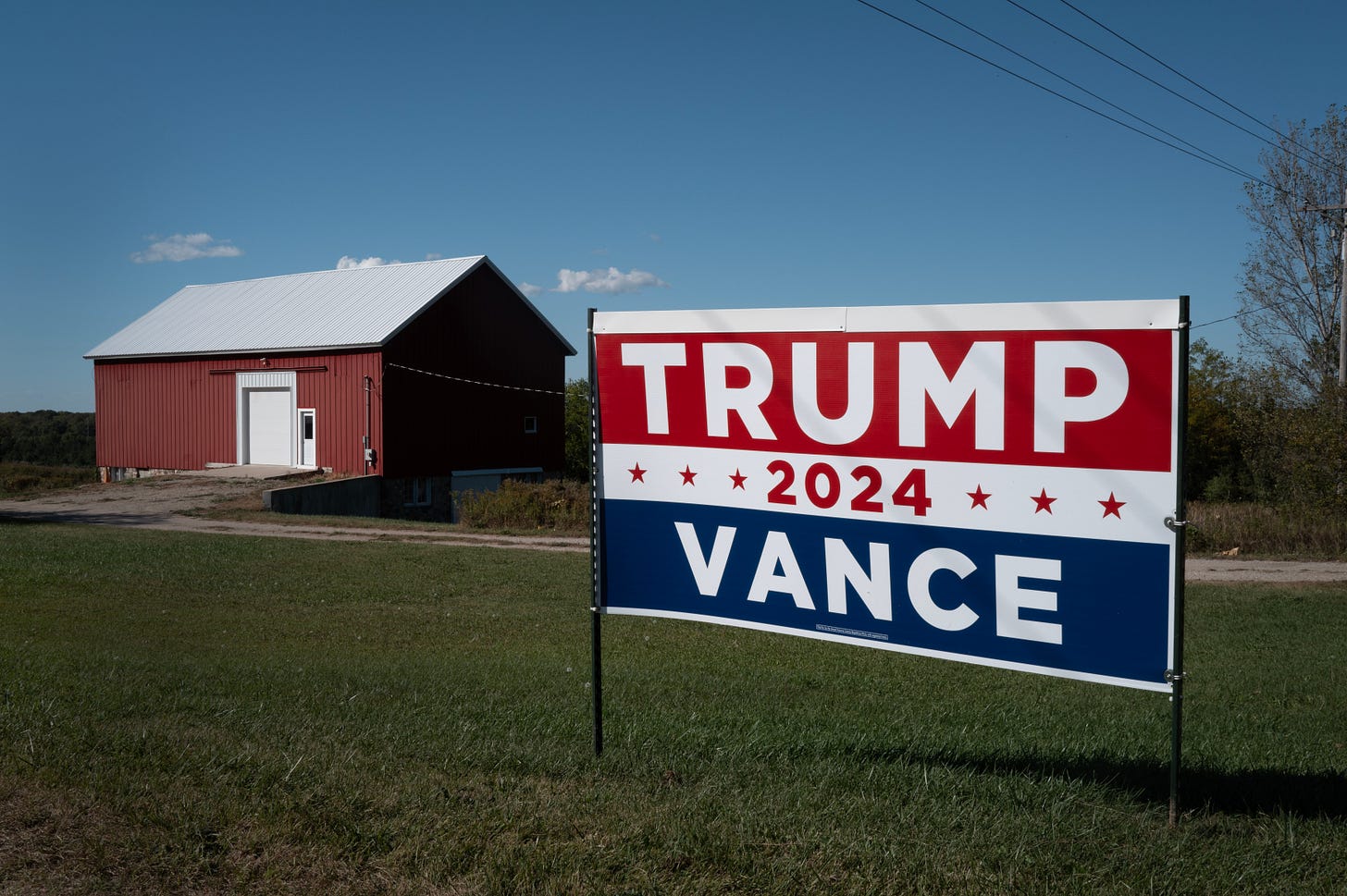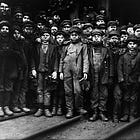The white rural reckoning
Trump is betraying the very voters who put him back in power.
Tom Schaller
and
Paul Waldman
May 15, 2025

A scene alongside a rural highway near Kingsley, Michigan, last September. (Scott Olson/Getty)
This article is co-authored by Tom Schaller and Paul Waldman. Their book “White Rural Rage: The Threat to American Democracy” will be released in paperback later this month. Schaller is professor of political science at the University of Maryland-Baltimore County. Waldman is a columnist for MSNBC; his Substack newsletter is The Cross Section.
After our book, “White Rural Rage: The Threat to American Democracy,” hit shelves in February of last year, we made a wager: Tom bet that Donald Trump’s support among rural white voters had peaked in 2020, and Paul predicted Trump would further increase his white rural support in 2024.
Alas, Paul looks to be the winner. While the final tallies are not yet in, the AP Votecast shows that Trump’s overall rural support increased by three points from 2020 to 2024, and about three-quarters of rural residents are white. Those numbers indicate he’s pushed up his ceiling among rural voters each of the three cycles he’s been on the ballot.
More than 100 days into his second term, however, Trump’s policies are starting to wreak havoc on the very rural white citizens who have been his most loyal geo-demographic voting base. If they voted for Trump last year hoping he’d make their lives better, they’re quickly finding out they made a mistake.
Farm policy
Given the damage of Trump’s first-term agriculture tariffs, rural American farmers may have forfeited the right to express surprise or dismay about what’s happening to them — again.
Despite Trump’s “trade wars are easy to win” bluster, farmers learned the hard way in 2018 and 2019 how easily those wars are lost, especially when the primary combatant is China. After Beijing reciprocated by retaliating against Trump’s tariffs with its own on US farm exports in Trump’s first term, American farming losses and bankruptcies quickly mounted. Trump had to authorize $28 billion in farm bailouts to make up for the damage farmers endured.
This time around, the cost of Trump’s chaotic trade policy to farmers is magnified by three factors.

Trump demands wartime sacrifices. Good luck with that.
Aaron Rupar and Stephen Robinson
·
May 8
Read full story
The first is Trump’s wildly chaotic imposition of tariffs, which complicate farmers’ crop decisions. Unpredictable tariff policies create uncertainties for any affected industry, of course. But unlike a car bumper or a computer chip, fruits and vegetables are perishable. Farmers unable to make informed short-term or seasonal decisions inevitably suffer irreversible losses. (Sadly, as Grist reports, unpredictable tariff rates also increase food waste at a time when an estimated 14 million American children — many of them rural — live in food insecure homes.) Manufacturers of farm machines are also handcuffed by uncertain trade policies, which are likely to curb industry revenues and cause layoffs.
The second factor is shrinking demand caused by the administration’s reckless DOGE cuts. The dismantling of the US Agency for International Development (USAID) has been devastating for people around the world who relied on American aid, but has hurt American farmers, too. The shuttering of USAID programs threatens the roughly $2 billion in food that the USDA purchases annually from American farmers to supply USAID aid programs that feed starving people around the globe. Those purchases have stopped, leaving crops sitting in storage with no one to buy them. Large-scale farmers in Texas and Virginia are already taking a hit.
As it did in his first term, Trump’s trade wars inevitably produce retaliatory tariffs on American agricultural products, further drying up the market for ag exports, especially to China, which bought $12.8 billion worth of American soybeans last year. Although Trump bailed out farmers for the devastation from his (far smaller) first-term tariffs, it is not certain whether he will do so again; libertarians like Reason magazine’s Eric Boehm are already calling for a no-bailout policy.
Finally, Trump is coupling tariffs with a deportation policy that will remove an untold number of migrant farm workers whose cheap, irreplaceable labor supply keeps food prices low. As Sandro Steinbach, director of the Center for Agricultural Policy and Trade Studies at North Dakota State University, told The Atlantic before Trump took office, “Any of those [tariff and deportation] policies will be pretty painful in the short run for rural America.”
Coal and extractive industries
Few regions voted for Donald Trump with more enthusiasm than coal country, a land of broken Trump promises.
Since 2016, Trump has repeatedly claimed he’d bring back all the coal jobs that have disappeared, but he has never delivered. He recently brought a group of coal miners to the White House for a photo op to announce a pair of executive orders meant to promote coal.
“We're bringing back an industry that was abandoned despite the fact that it was just about the best,” Trump said. “We're going to tap that magnificent potential to give our people the glorious future that they deserve, better than they've ever had in the past.”
Trump was so proud of himself that at a fundraiser soon after, he told wealthy donors not to worry about his gullible supporters getting a different kind of job.
“They love to dig coal,” he said. “That's what they want to do. They don't want to do gidgets and widgets and gadgets. They don't want to build cell phones with their hands. They're big strong hands.”
Aaron Rupar (@atrupar.com)
Trump: "One thing I learned about the coal miners -- that's what they want to do. You could give them a penthouse on 5th Avenue and a different kind of a job and they'd be unhappy. They want to mine coal. She was gonna put them in a high tech industry where you make little cell phones and things."
Coal is in a long and inexorable decline, but the miners who are left need the government’s help — help Trump is withdrawing.
Trump and Elon Musk are gutting the National Institute of Occupational Safety and Health, which helps protect miners from black lung disease, an often fatal ailment that has been resurgent in recent years. The administration also paused a regulation established under the Biden administration to limit miners’ exposure to silica dust, a major cause of black lung. And DOGE is planning to close dozens of Mine Safety and Health Administration field offices.










